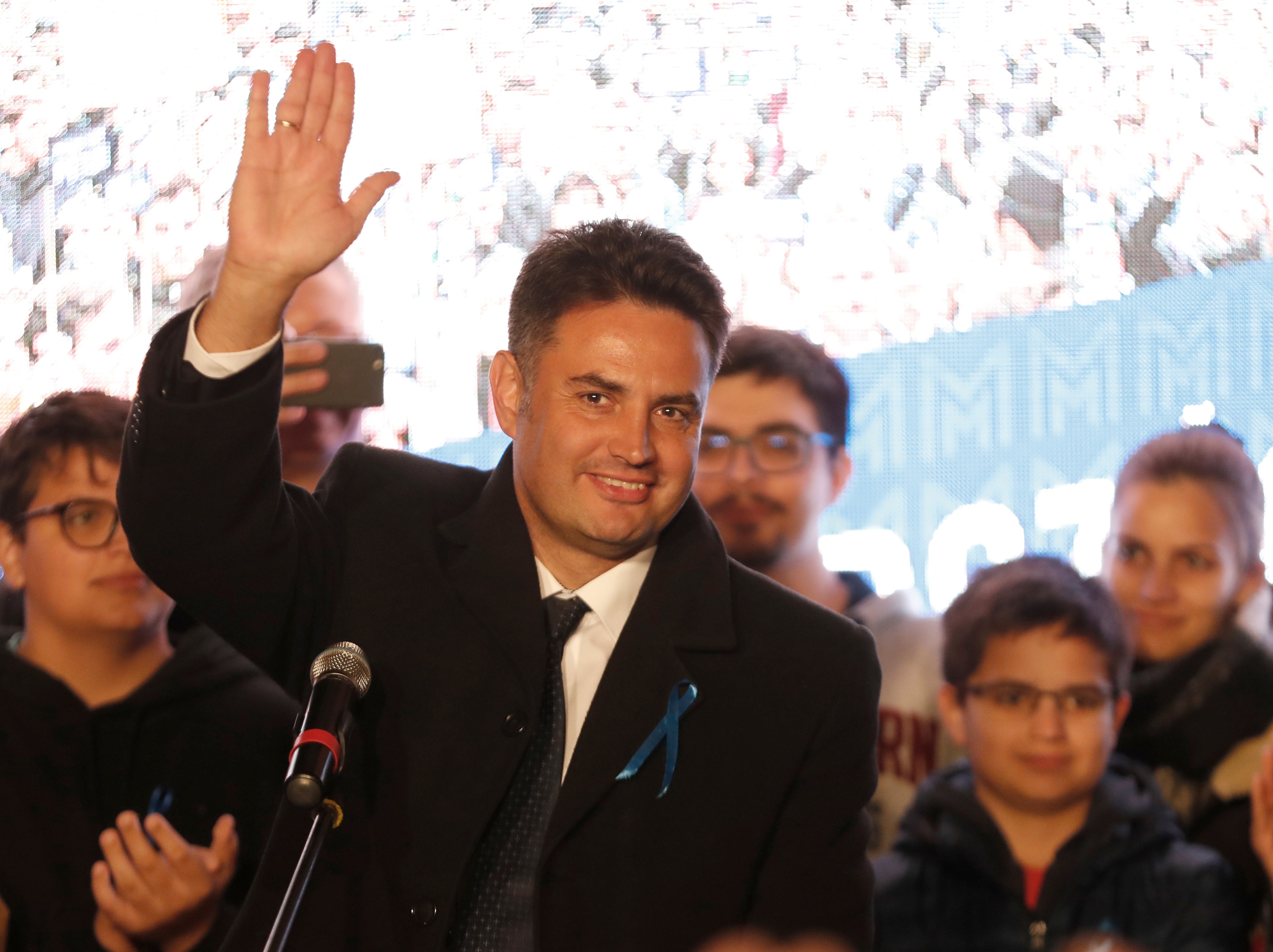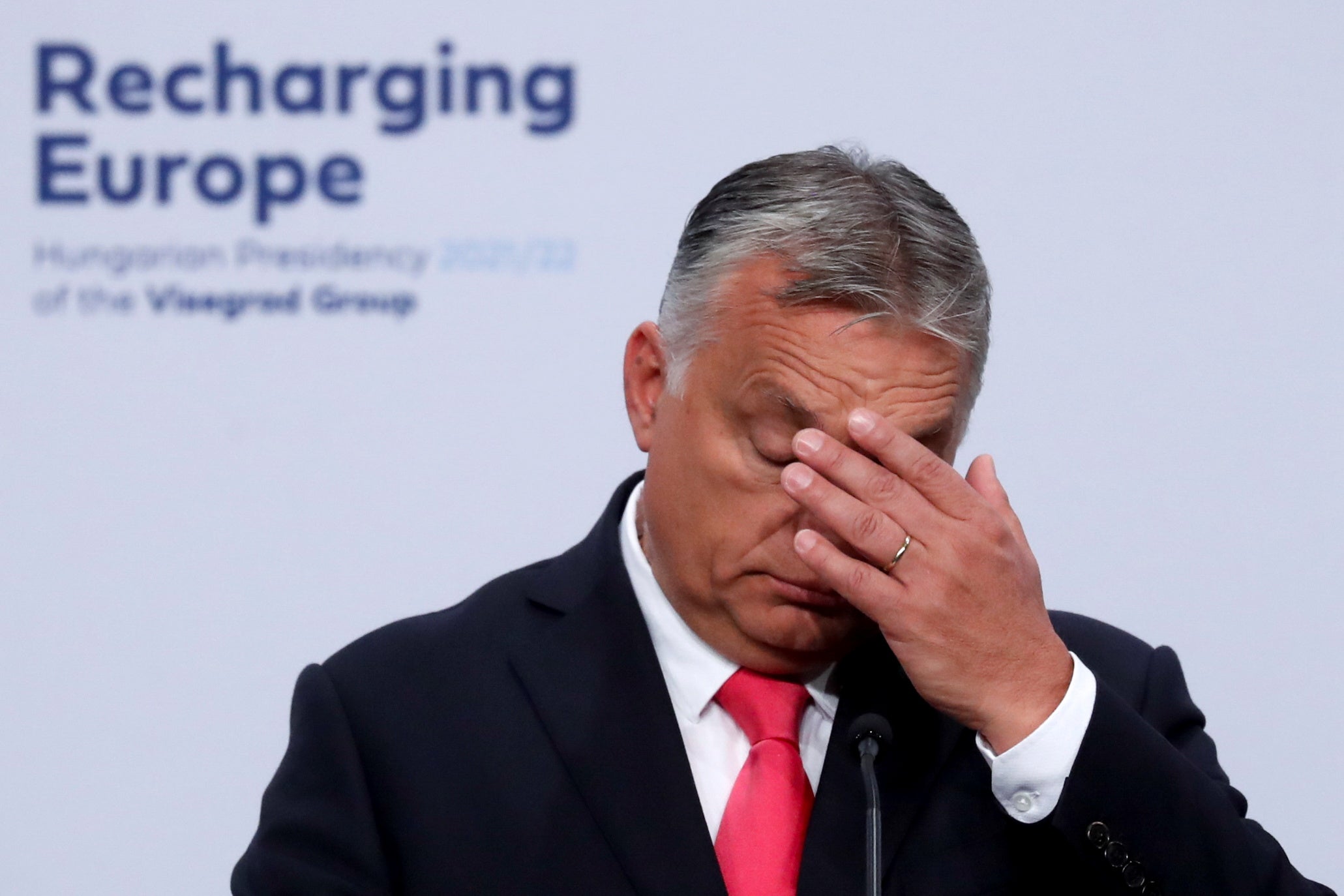The man who will take on Orban: The unknown father of seven elected to challenge Hungary’s populist leader
Peter Márki-Zay’s victory is a shock to Orbán, who will find it much harder to brand him as a liberal who will demolish ‘traditional Hungarian values’, reports Amanda Coakley


To “Fidesz or not Fidesz”, that was the question Péter Márki-Zay, the conservative mayor of a small southern Hungarian town, put to supporters.
The unknown politician asked while giving his victory speech on Sunday after it emerged he will be the sole challenger to prime minister Viktor Orbán in next spring’s parliamentary election following two rounds of opposition primaries, a first for the central European nation.
With no party affiliation, the 49-year-old father of seven defeated the left-liberal Democratic Coalition candidate Klára Dobrev MEP, a vice-president in the European Parliament and wife of former prime minister Ferenc Gyurcsány, signalling voters’ desire for a fresh face and a candidate that does not represent an old elite.
“There will be a choice next year,” Mr Márki-Zay told his supporters. “Though not free, not really democratic, this match will be one where one team has to play with their feet connected. But even in a match like this, we can win.”
When Hungary’s fragmented opposition united in December 2020 to take down Mr Orbán by choosing to elect joint candidates in individual electoral districts and for prime minister, Mr Márki-Zay was very much the outsider. Indeed several people had never heard of the former engineer who only came to prominence in 2018 after ousting the ruling party candidate in the mayoral race of the southern city of Hódmezővásárhely.
Sunday’s result is a shock to Mr Orbán and his Fidesz party, who will find it much harder to brand the new opposition coalition leader as a rouge liberal on a quest to demolish “traditional Hungarian values”. Mr Márki-Zay has continually presented himself as a conservative smalltown man who wants to improve Hungary’s frayed relationship with the European Union, introduce the euro, and roll back many of Fidesz’s discriminatory laws, especially in relation to the LGBTQ+ community.
“This is a big surprise. A few months ago, no one thought Márki-Zay would be a candidate for prime minister”, Andrea Virág, a political scientist, told The Independent.
“He convinced voters that he is the one to beat Orbán in the rural areas next year. His criticism not only of the government but of the opposition also helped his campaign. He also didn’t promise everything to voters. He’s made it clear that should he win, hard choices would have to be made. That was very refreshing for many people.”
The challenge for Mr Márki-Zay over the next six months will be to keep the six-party opposition coalition together while building a campaign that can appeal to Hungary’s undecided voters. The coalition is home to parties of all political colours and includes the far-right-turned-centre-right, Jobbik.
This is a big surprise. A few months ago, no one thought Márki-Zay would be a candidate for Prime Minister
Although some will see Mr Márki-Zay as a far more fitting candidate than Ms Dobrev, whose party embodies Hungary’s old left, his lack of political experience could trigger disenfranchised members of the coalition to break off. Speaking to reporters in Budapest on Sunday, he said he hoped his colleagues in the opposition would “keep their promises” and stay in the coalition.
Over a decade in power, Mr Orbán has hollowed out Hungary’s democracy. Using Fidesz’s two-thirds “supermajority” in parliament, the government has amended the country’s constitution, stacked the courts with party loyalists, weakened the country’s media ecosystem by pushing out critical publications, and drafted discriminatory laws. The most recent included a ban on showing the content of homosexuality or gender reassignment to minors – a move that sparked controversy with Brussels.
Election maps have been gerrymandered in favour of Fidesz, EU funds mismanaged, hardline migration policies introduced, and the Central European University – an institute funded by Mr Orbán’s nemesis, billionaire financier George Soros – kicked out of the country.
The erosion of Hungary’s checks and balances has meant Budapest is yet to receive coronavirus recovery funding from the EU under the bloc’s rule of law mechanism.

The opposition primaries started in September and saw more than 600,000 people vote in the first round. Ms Dobrev won with Mr Márki-Zay in third. The second-place candidate, Mayor Karácsony, dropped out before the run-off and threw his support behind Mr Márki-Zay. Over 650,000 people turned out to vote in the second round, which took place during the past week.
At the moment, Fidesz and the opposition coalition are neck and neck in the polls, and with the latter going after a two-thirds “supermajority” in addition to a win next spring, the race is expected to heat up quickly.
“The peculiarities of the Hungarian elections are such that if you widen the gap between the opposition and Fidesz, there comes the point where a two-thirds majority is possible,” said Dávid Korányi, a senior adviser to Budapest’s Mayor Gergely Karácsony.
“Odds are below 50 per cent for the opposition to get that, but it’s possible. Even if they don’t get a supermajority, they will still be able to dismantle the structures that Fidesz has built up over the years.”






Join our commenting forum
Join thought-provoking conversations, follow other Independent readers and see their replies
Comments